What is Business Texting?
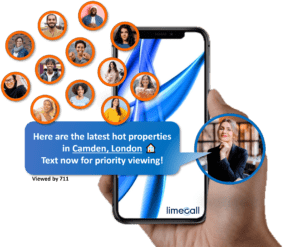
Business texting is a direct and convenient way for businesses to engage in two-way communication with their customers. Once a customer opts-in, your business can send them text messages containing offers, discounts, surveys, order updates, and more. This two-way interaction allows customers to receive information promptly and respond quickly.
How Do Businesses Use Text Messages?
Whether you’re a small business owner, an influencer, an in-house marketer, or an agency, business texting offers valuable benefits. Here are some common use cases:
- Lead Enrichment: Enhance lead quality by identifying “unicorn” leads with higher conversion potential.
- Customer Feedback: Gather valuable insights by sending surveys and polls to gauge customer sentiment on products, services, and communication.
- Promotions and Offers: Quickly communicate special offers, discounts, and sales incentives to drive engagement.
- Pre- and Post-Sales Communication: Keep customers updated on their purchases, answer inquiries, and facilitate smooth transactions.
Features for Effective Business Texting:
- Contact growth tools: Build your subscriber list effectively.
- Engagement campaigns: Launch targeted text blasts to specific audience segments.
- Drip sequences: Create automated text message workflows to nurture leads and engage customers over time.
- Integration with your marketing stack: Streamline communication by connecting your chosen platform with your CRM, marketing automation platform, and other essential tools.
Why is Business Texting Important in 2024?
The answer is simple: effectiveness. With a staggering 98% open rate, SMS marketing outperforms email marketing significantly (average open rates typically range from 10-30%). Here are some key reasons why businesses are embracing text messaging:
- High engagement: Customers are more likely to open and read text messages compared to emails.
- Direct communication: Reach your audience directly on their mobile devices, ensuring timely and impactful messaging.
- Personalization: Create targeted and personalized campaigns to resonate with individual customer preferences.
- Increased sales: Drive conversions by promoting special offers, discounts, and relevant products.
- Improved customer relationships: Foster stronger connections with your audience through personalized communication.
Ready to Get Started?
By incorporating a robust business texting solution into your marketing strategy, you can unlock its full potential, attracting new customers, fostering deeper connections, and propelling your business towards sustainable growth. Remember, effective communication goes beyond just reaching your audience – it’s about forging meaningful connections and building long-lasting relationships.
Why SMS is useful to businesses?
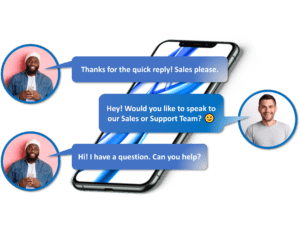
In business, every second counts, especially when it comes to lead conversion. Traditional outreach methods like phone calls can leave valuable time windows open for competitors to swoop in. That’s where business text messaging comes in, offering a powerful and immediate way to connect with potential customers and solidify your presence in the race for the sale.
The Speed Advantage: Converting While the Iron is Hot
Time truly is money, especially for your sales team. Studies show that the longer your team waits to contact a lead after an inquiry, the lower the chances of closing the deal. Business text messaging shines in this scenario, allowing your team to respond within the golden window of opportunity. Here’s some compelling evidence:
- 7x More Likely to Qualify Leads: If your team texts potential customers within an hour of receiving an inquiry, they are seven times more likely to qualify the lead compared to waiting beyond an hour.
- Optimal Response Time is 5 Minutes or Less: This aligns perfectly with the fact that 60% of people open their text messages within five minutes of receiving them. By leveraging the immediacy of text messaging, you can significantly increase your chances of engaging prospects before they lose interest.
Building Trust and Connection: The Human Touch in a Digital Age
Beyond speed, business text messaging offers a unique opportunity to establish genuine connections with leads. In a world saturated with digital interactions, consumers crave a human touch. Consider these statistics:
- 82% of American Consumers Want More Human Interaction: Customers feel disconnected from brands and yearn for personalized interactions.
- 35% of Consumers Pay More for Human Interaction: This highlights the value consumers place on personal connections, even during the sales process.
By employing business text messaging, your team can bridge the gap and foster a sense of connection with leads. This personalized approach can build trust, set you apart from the competition, and ultimately lead to higher conversion rates.
Efficiency Through Automation: Empowering Self-Service and Building Trust
While a human touch is crucial, striking the right balance with efficiency is critical in today’s fast-paced world. Business text messaging empowers customers by offering self-service options through automated text messages. This allows leads to:
- Book Appointments and Schedule Meetings: Eliminate email exchanges and phone tag with instant scheduling options.
- Confirm Logistics and Directions: Ensure a smooth experience by providing directions and logistics for meetings or deliveries via text.
- Receive Personalized Thank Yous: Express gratitude for business and strengthen relationships with post-interaction thank you messages.
- Offer Feedback and Testimonials: Gather valuable insights and testimonials through convenient text-based surveys.
These automated interactions, combined with personalized touches from your team, create a seamless and positive customer experience, fostering trust and brand loyalty in the long run.
3 Key Benefits of Business Text Messaging for Your Sales Team:
- Be First: The statistics speak for themselves – most people open texts within minutes, and 78% choose to purchase from the first company that responds. By leveraging the speed of texting and automation, you can significantly increase your chances of being the first to connect and win the sale.
- Create Connections: As discussed, human interaction is vital for building trust and relationships. Business text messaging facilitates this by creating a more personal touch compared to traditional communication methods.
- Deliver a Positive Customer Experience: By combining an immediate response, a personal touch, and a streamlined sales process, business text messaging can significantly enhance the overall customer experience, leading to higher satisfaction and repeat business.
The Future of Text Messaging: AI as a Supportive Tool
While artificial intelligence (AI) has the potential to revolutionize various aspects of business, it’s important to remember that it can never fully replace the power of human connection. AI can play a valuable role in supporting your sales team by:
- Improving Efficiency: Automate repetitive tasks like appointment reminders and follow-up messages, freeing up your team’s time for more complex interactions.
- Providing Deeper Insights: Analyze text conversations and customer engagement data to gain valuable insights into lead behavior and preferences.
- Facilitating Easy Automations: Design automated workflows for various scenarios, ensuring timely and personalized communication without overwhelming your team.
However, it’s crucial to remember that AI should be used as a tool to enhance, not replace, human interaction. Complex decisions often require a personal touch, and building genuine connections with potential customers remains an essential ingredient for sales success.
By incorporating business text messaging into your sales strategy, you can equip your team with the tools they need to connect with leads faster, build trust more effectively, and ultimately convert more sales opportunities. Remember, in the age of instant communication, speed, personalization, and a positive customer experience are key differentiators. Business text messaging offers a powerful solution to address these needs and propel your sales
Key Benefits of Business Text Messaging
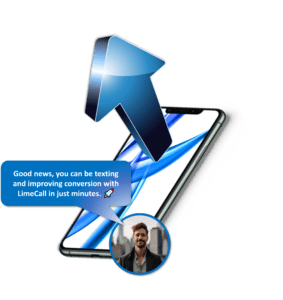
While you might still be considering the potential of business text messaging, there are compelling reasons why it should be a cornerstone of your communication strategy. Let’s delve into three key benefits that can significantly impact your business:
- Be the First to the Finish Line: Speed Drives Sales
In today’s fast-paced world, time is of the essence, especially when it comes to converting leads into loyal customers. Traditional communication methods like email can leave valuable time windows open for competitors to swoop in. This is where business text messaging shines, offering your business a crucial edge:
- Explosive Open Rates: Statistics show that a staggering 98% of text messages are opened by recipients, compared to a much lower average of 10-30% for email open rates. This means your message has a much higher chance of being seen and acted upon promptly.
- The Power of Immmediacy: Most people open their text messages within five minutes of receiving them. This immediacy translates into faster response times, allowing your team to engage with potential customers while their interest is still high. Studies reveal that sales reps who text leads within an hour of receiving an inquiry are seven times more likely to qualify them compared to waiting.
- Automate for Efficiency: Leverage text message automation to send quick responses and follow-ups, ensuring you’re always the first to connect with your leads. This allows your team to focus on more complex interactions while still maintaining a responsive presence.
By harnessing the speed and convenience of text messaging, you can significantly increase your chances of capturing leads before they lose interest and convert them into satisfied customers.
- Building Trust Through Personalized Connections
In an age dominated by digital interactions, consumers crave a human touch. Generic emails and impersonal communications can leave them feeling disconnected. Business text messaging offers a unique opportunity to bridge this gap and build genuine connections with your audience:
- Embrace the Personal Touch: Text messages feel more personal than emails, fostering a sense of direct communication and connection with your customers. This informality can make your brand seem more approachable and relatable.
- Cater to Preferences: Unlike mass email campaigns, text messaging allows for more targeted and personalized interactions. You can segment your audience based on preferences and tailor your messages accordingly, creating a more meaningful experience for each customer.
- Respond in Real-Time: Unlike phone calls that might go unanswered, text messages offer the convenience of asynchronous communication. Customers can respond at their own pace, while your team can still provide timely responses through quick text messages, creating a sense of responsiveness and attentiveness.
By fostering a sense of connection and personalization through text messaging, you can build trust with your audience, differentiate yourself from the competition, and ultimately establish lasting relationships with your customers.
- Delivering a Seamless and Positive Customer Experience
The overall customer experience plays a crucial role in shaping brand perception and influencing future interactions. Business text messaging can significantly enhance this experience by offering several key advantages:
- Streamlined Communication: Text messages provide a convenient and efficient way for customers to communicate with your business. They can ask questions, schedule appointments, and address concerns directly through text, eliminating the need for lengthy phone calls or complex email exchanges.
- Increased Engagement: The ability to receive updates, promotions, and reminders directly on their mobile devices keeps customers informed and engaged with your brand. This fosters a sense of connection and encourages repeat business.
- Simplifying Processes: Text message automation can be used to send appointment confirmations, delivery notifications, and order updates, streamlining the customer journey and eliminating unnecessary friction.
By providing a seamless and positive customer experience through convenient and efficient communication, you can foster customer loyalty, encourage repeat business, and solidify your brand reputation.
These are just a few of the compelling benefits that business text messaging offers. By incorporating it into your communication strategy, you can equip your business with the tools it needs to thrive in today’s fast-paced and competitive environment.
Top reasons why businesses are turning to SMS in 2024
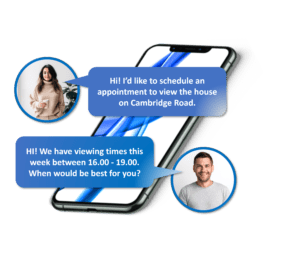
While various digital marketing channels exist, text message marketing, also known as SMS marketing, has surged in popularity in recent years. This isn’t surprising considering the numerous advantages it offers businesses in today’s competitive landscape. Let’s delve into the top reasons why businesses are turning to SMS marketing in 2024:
- Fostering 1:1 Relationships:
In an era of mass communication and impersonal interactions, consumers crave authenticity and genuine connection. SMS marketing allows businesses to establish a more direct and personal dialogue with their customers. Unlike blasting out generic emails to a large audience, text messages create a sense of one-on-one communication, fostering a stronger connection between brand and customer. This personalized approach can increase brand loyalty and trust, ultimately leading to higher customer satisfaction.
- The Power of Simplicity and Brevity:
In today’s fast-paced world, people are constantly bombarded with information. Conciseness reigns supreme, and SMS marketing embraces this principle perfectly. Text messages are short and to the point, allowing businesses to deliver clear and concise information to their customers without overwhelming them. This increases the likelihood of the message being read and understood, leading to better engagement and recall.
- Hyper-Targeting for Personalized Customer Journeys:
Unlike traditional marketing methods, SMS marketing allows for highly targeted campaigns based on various factors like demographics, purchase history, and location. Most SMS platforms automatically capture a customer’s time zone from their phone number, enabling you to schedule messages for optimal delivery based on their location. Additionally, you can leverage various data points to understand customer preferences and interests. This allows you to personalize the content of your messages, crafting targeted offers and promotions that resonate deeply with individual customers. By tailoring the customer journey based on their specific needs and interests, you can significantly increase engagement and conversion rates.
- Re-engaging Customers Through an Opt-In Channel:
One of the biggest challenges in marketing is re-engaging dormant customers. With SMS marketing, businesses have access to a powerful opt-in channel that allows them to reconnect with past customers who have explicitly consented to receive text messages. This provides a valuable opportunity to remind them about your brand, rekindle their interest, and entice them to return for further purchases.
- Unparalleled Engagement Rates:
Compared to other marketing channels, SMS boasts exceptional engagement rates. Studies show that over 90% of text messages are opened within three minutes of being received, while the average email open rate hovers around 20-30%. This remarkable difference highlights the effectiveness of SMS in capturing attention and driving engagement. By delivering your message directly to customers’ mobile devices, you increase the chances of them seeing and interacting with your content, leading to a higher return on investment for your marketing efforts.
These are just a few of the compelling reasons why businesses are increasingly turning to SMS marketing in 2024. Its ability to foster closer relationships, leverage the power of conciseness, enable hyper-targeting, re-engage customers, and deliver unmatched engagement rates make it a valuable tool for businesses of all sizes looking to connect with their audience in a meaningful and impactful way.
Best practices for small business text messaging

Small businesses need to embrace every available avenue to connect with their customers effectively. Text messaging, with its high open rates and personal touch, has emerged as a powerful tool in this digital landscape. However, simply sending out texts isn’t enough. To harness the true potential of this communication channel, small businesses need to establish best practices that ensure responsible, respectful, and impactful engagement with their customers.
- Ensuring Compliance and Respecting Privacy: The Foundation of Trust
Before embarking on any SMS marketing campaign, familiarizing yourself with the legal landscape surrounding text messaging is crucial. Regulations like the Telephone Consumer Protection Act (TCPA) in the US and the CAN-SPAM Act in Canada outline specific requirements for obtaining consent, message content, and opt-out options. Failing to comply with these regulations can result in hefty fines and damage your brand reputation.
Building trust with your customers starts with respecting their privacy. Obtaining explicit consent, known as “opt-in,” is an absolute must for any marketing campaign via text message. This means customers must have a clear understanding of what they’re signing up for and be able to easily unsubscribe (opt-out) at any time. Common practice involves adding a clear opt-out instruction like “Reply STOP to unsubscribe” in your marketing messages.
- Crafting a Professional Voice: Building Brand Identity
Remember, every interaction with your customers, including text messages, is a reflection of your brand identity. Maintaining a professional tone is essential in establishing trust and credibility. This means:
- Using proper grammar and spelling: This demonstrates attention to detail and professionalism.
- Avoiding excessive capitalization: Excessive caps can come across as shouting and aggressive, detracting from your message.
- Keeping messages concise and to the point: Respect your customers’ time by focusing on one clear message per text.
- The Power of Personalization: Going Beyond the Generic
While automation and scaling are key advantages of text message marketing, it’s crucial to avoid sounding robotic. Personalization goes a long way in establishing a connection with your customers and making them feel valued. Here are some ways to personalize your messages:
- Addressing customers by name: This demonstrates effort and shows you care about individual interactions.
- Segmenting your audience: Group customers based on purchase history, interests, or other relevant factors to tailor messages and offers accordingly.
- Using emojis thoughtfully: Emojis can add a touch of personality, but use them sparingly and ensure they align with your brand voice and the overall tone of your message.
- Finding the Sweet Spot: Timing and Frequency for Optimal Engagement
Timing and frequency are critical elements for successful text message marketing. Sending a text at the wrong time can be intrusive and counterproductive. Ideally, you want to reach customers when they’re receptive to your message. Here are some tips:
- Analyze your audience: Consider factors like demographics and purchasing habits to understand their typical behavior patterns.
- Test different times and days: Experiment with different sending times and track engagement rates to determine the sweet spot for your audience.
- Respect boundaries: Avoid sending texts late at night or early in the morning, as it can be disruptive and portray a lack of respect.
- Avoid over-communication: Remember, less is often more. Aim for quality over quantity and focus on sending valuable and relevant messages.
- Choosing the Right Tool for the Job: Optimizing Your Workflow
While sending individual text messages might be feasible for a small contact list, it’s neither scalable nor efficient for businesses with growing customer bases. Utilizing an SMS marketing platform like LimeCall can provide a plethora of benefits:
- Mass messaging: Easily send the same message to a large number of customers simultaneously.
- Automated campaigns: Schedule and automate text message campaigns to streamline your marketing efforts.
- Integration with other business software: Connect your SMS platform with your CRM, marketing automation platform, or other business applications for seamless data flow and deeper customer insights.
- Analytics and reporting: Track campaign performance, analyze engagement data, and gain valuable insights to optimize your future efforts.
By following these comprehensive guidelines and leveraging the power of a robust SMS marketing platform like LimeCall, small businesses can unlock the full potential of text messaging. This powerful communication channel allows you to build trust, connect with your customers on a personal level, and ultimately drive business growth through targeted and engaging marketing campaigns. Remember, effective communication goes beyond just words; it’s about fostering genuine connections and building lasting relationships with your audience.
Business texting etiquette: 14 rules for your SMS campaign
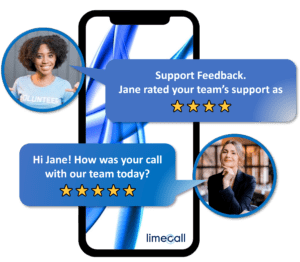
Business texting has become a vital communication tool. It allows for quick and efficient communication with customers, partners, and employees. However, maintaining professionalism and building strong relationships requires understanding the nuances of texting etiquette. Here are some essential tips to help you navigate the world of business texting:
Permission is Key: Before you hit send, always obtain written consent from the recipient. This shows respect and ensures they’re comfortable receiving business messages via text. Make opting in and opting out easy for them, and utilize group consent features for responsible group messaging.
Sign Off Clearly: Don’t leave your recipients guessing who they’re communicating with. Sign off with your name, initials, or company name for clarity. Consistency is key, so consider establishing a format you’ll use consistently across all your texts. If relevant, include additional contact information or your job title in your signature.
Greetings and Farewells Matter: Start your messages with professional greetings like “Hello [Name],” “Good morning/afternoon/evening,” or “Greetings, [Name].” When possible, personalize your messages by adding the recipient’s name. Conclude with polite closings like “Thank you,” “Best regards,” or “Looking forward to hearing from you.” These simple gestures go a long way in establishing a professional and courteous tone.
Less is More: Time is valuable, and nobody appreciates deciphering lengthy texts. Be concise and clear in your messages, focusing on one key message and removing unnecessary words. Consider using texting templates to ensure consistent formatting and clarity while maintaining professionalism.
Maintain a Consistent Tone: Craft your messages carefully to convey the intended tone. Aim for a consistent, approachable, and professional tone across all communication channels. Avoid using all caps, which can be perceived as shouting and come across as aggressive.
Emojis: Use with Caution: While emojis can add a touch of personality, use them sparingly to avoid appearing too casual or unprofessional. Be mindful of the different meanings emojis can have across cultures and age groups. Ensure the emoji matches the tone of your message and consider recipient preferences and the context of the conversation.
Proofread and Double-Check: Nobody wants to receive a text riddled with errors. Take the time to proofread your message thoroughly before sending it. Be wary of autocorrect and autocomplete mistakes. Utilize your phone’s drafting tools and spellcheck to ensure clear and error-free communication.
Double-Check the Recipient: Avoid a potential faux pas by verifying the recipient before sending your message. Utilize contact management tools to ensure your messages are going to the intended recipient. Avoid mass texting your entire list – target specific individuals when appropriate. If you do send a message to the wrong person, apologize immediately.
Choose the Right Channel: Not all information is suitable for texting. For sensitive information or complex discussions, use other channels like email or phone calls. Texting is best suited for short updates, reminders, and emergencies.
Respect Texting Hours: Limit business texts to between 8 am and 9 pm unless urgent. Avoid disrupting recipients during their personal time. Consider using scheduling features to send texts at appropriate times.
Be Patient and Responsive: Give recipients time to respond and avoid sending repeated messages. Acknowledge and respond to messages promptly, demonstrating respect and professionalism.
Focus on the Present: Avoid texting during meetings. It shows disrespect to others and disrupts the flow of the conversation. Give the meeting your full attention.
Set Clear Expectations: If you’re unavailable outside business hours or receive high volumes of texts, use auto-reply messages to manage expectations. Explain when recipients can expect a response and offer alternative contact channels if needed.
By following these guidelines, you can ensure your business texting practices are professional, respectful, and contribute to building stronger relationships with your customers, partners, and employees. Remember, effective communication goes beyond just words – it’s about fostering trust and respect through your actions as well.
Practical use cases of automated SMS
Here, efficiency is key. This is where automated SMS shines, offering a convenient and effective way to streamline various communication tasks for your business. You’ve likely encountered automated text messages yourself, receiving appointment reminders, school announcements, Uber ride updates, and more. But the applications of automated SMS extend far beyond these familiar examples, offering a multitude of benefits for businesses:
- Simplifying Routine Communication:
Automated SMS eliminates the need for manual communication for repetitive tasks. Imagine replacing cumbersome phone calls and lengthy emails with quick and efficient text messages. You can send:
- Appointment Confirmations: Save time and ensure customers arrive on time with automated appointment reminders.
- Order and Payment Notifications: Keep customers informed with automatic order confirmations, shipping updates, and payment receipts.
- Delivery Status Alerts: Provide real-time updates on deliveries, allowing customers to track the progress of their packages conveniently.
- Boosting Customer Engagement:
Going beyond basic communication, automated SMS fosters engagement with your audience. Here are some effective ways to leverage this:
- Promotion and Flash Sale Alerts: Inform customers about upcoming promotions and flash sales directly through their mobile devices, driving immediate action.
- Abandoned Cart Reminders: Gently nudge customers who abandon their online shopping carts with a friendly reminder, potentially salvaging lost sales.
- Personalized Drip Campaigns: Create targeted drip campaigns to nurture leads, deliver relevant content, and guide them through the sales funnel.
- Enhancing Customer Experience:
Automated SMS goes beyond just sending information; it shows your customers that you care. Consider these applications:
- Auto-Responses During Off-Hours: Acknowledge and address customer inquiries outside of business hours with an automated message informing them you’ll follow up promptly.
- Satisfaction Surveys and Feedback Requests: Gather valuable customer insights by sending post-interaction surveys or requesting feedback through convenient text messages.
- Emergency Alerts and Reminders: Inform customers about important updates, service disruptions, or safety warnings, ensuring timely communication during crucial moments.
- Streamlining Lead Generation and Nurturing:
Automated SMS can play a vital role in your lead generation and nurturing efforts:
- Lead Qualification: Send automated messages asking qualifying questions to understand customer needs and potential, saving your team valuable time.
- Lead Nurturing: Engage with potential customers through automated SMS campaigns, providing valuable content and nurturing their interest in your products or services.
- Appointment Scheduling: Offer customers the convenience of scheduling appointments directly through text after expressing initial interest, streamlining the lead conversion process.
- Building Stronger Relationships:
By utilizing automated SMS thoughtfully, you can foster stronger relationships with your customers:
- VIP Recognition: Recognize loyal customers by sending exclusive offers and promotions through dedicated SMS campaigns, demonstrating your appreciation for their patronage.
- Birthday and Anniversary Greetings: Send personalized birthday or anniversary greetings via text message, adding a personal touch and strengthening customer connection.
- Thank You Messages: Express your gratitude for customer purchases or interactions with a simple, automated thank you message, leaving a positive lasting impression.
These are just a few examples of how automated SMS can transform the way you interact with your customers. By embracing its versatility and efficiency, you can streamline communication, boost engagement, enhance customer experience, and ultimately drive business growth in a competitive marketplace. Remember, effective communication goes beyond just reaching your audience – it’s about fostering meaningful connections and building lasting relationships.
6 Examples of Professional Text Messages
This guide provides six real-world examples to inspire you and equip you with the knowledge to create impactful text messages for your small business texting strategy:
- Reminder Powerhouse:
- Applications: Appointments, special offers, sales, events, application status, payments, shipments, coupon expiry dates.
- Example: “Trusted Bank reminds you of your appointment at 23 Newington Way on Monday, August 13th at 10:00 AM. Your account manager is Timothy Jackson, phone 0748379393.”
- Promotional Prowess:
- Applications: Flash sales, new discounts, event sign-ups.
- Example: “Bethany Beauty: Exclusive deals just for you! Click here to subscribe: store.com/coupons-deals [invalid URL removed].” (Remember to segment your audience for targeted promotions!)
- Confirmation Confidence:
- Applications: Order confirmations, shipping updates, appointment reminders.
- Example: “**Hi Joy, your massage is confirmed for 4/27/19 at 12:00 PM ♀️. Please plan to arrive 15 minutes early. Reply ‘Yes’ to confirm.”
- Recruitment Reach:
- Applications: Schedule interviews, send application updates.
- Example: “**Hi Mark, thanks for applying for our IT position on LinkedIn. I have a role that fits what you’re looking for. Would you like to set up a call? – Kevin, MicroLabs.”
- Staff Synergy:
- Applications: Meeting updates, schedule changes, company announcements.
- Example: “**Hello Team – Friendly reminder that today’s 4:00 staff meeting has been moved to 4:30 in Conference Room C. Please text YES to RSVP. – Janice.”
- Survey Savvy:
- Applications: Customer satisfaction, product interest.
- Example: “**Hi Chad, How was your service today? Text GREAT, OK, or POOR to provide feedback. Thank you! – Lush Tech, lushtech.com.”
Remember, these are just a few examples to get you started. When crafting your own messages, keep these key points in mind:
- Personalize: Address recipients by name whenever possible.
- Be Concise: Keep your message short and to the point.
- Offer Value: Clearly state the benefit or action you want the recipient to take.
- Include a Call to Action (CTA): Guide the recipient towards your desired outcome.
- Proofread: Double-check for typos and grammatical errors before sending.
By following these tips and drawing inspiration from the examples, you can craft professional and effective text messages that connect with your audience and contribute to the success of your small business texting strategy.
Choosing the Right Texting Service Provider

In today’s digital landscape, text message marketing has emerged as a powerful tool for businesses of all sizes. However, for small businesses, navigating the plethora of available texting platforms can be overwhelming. This guide aims to equip you with essential knowledge to make an informed decision and select the perfect texting service for your needs.
- Prioritizing Simplicity:
Simplicity should be your guiding principle when choosing a texting service. As a small business owner, you likely don’t require every advanced feature under the sun. Look for a platform that offers a user-friendly interface with intuitive functionalities. Features like an easy onboarding process and essential texting tools such as scheduling, message templates, and contact management are key. Remember, you can always scale up and explore advanced features as your business grows.
- Unwavering Reliability:
Reliability is a crucial quality to consider. This encompasses several aspects:
- Network and System Reliability: Ensure the platform boasts a robust network infrastructure guaranteeing the timely and accurate delivery of your messages.
- Customer Service Reliability: Opt for a service with responsive and knowledgeable customer support to address your questions and concerns promptly.
- Automation Reliability: Look for a platform with dependable automated features that run seamlessly in the background, saving you valuable time and ensuring consistent communication.
- Making Sense of the Cost:
Pricing plans can vary significantly between texting services. Some platforms charge on a per-text basis, while others offer monthly subscriptions or bulk text messaging packages. Carefully analyze the different pricing models and compare them to your expected usage patterns. Aim to find a service that offers competitive rates and aligns with your budget.
- Exploring Feature Sets:
Texting services cater to small businesses by offering a diverse range of features beyond basic text messaging. Some popular features include:
- Drip Campaigns: Automate personalized message sequences to nurture leads and engage customers over time.
- Auto-Responses: Set up automated replies to handle frequently asked questions or acknowledge inquiries outside of business hours.
- Call-to-Text Options: Encourage customers to initiate conversations with you by providing a dedicated text message number.
- Engagement Tools: Leverage features like polls, surveys, and promotional offers to interact with your audience in a more engaging way.
By carefully considering these factors – simplicity, reliability, cost, and feature set – you can navigate the world of texting services confidently and choose the one that perfectly aligns with your small business needs and growth aspirations.
Let’s Round things up
It certainly is a dynamic business landscape, staying ahead of the curve necessitates utilizing innovative and impactful communication tools. Business text messaging has emerged as a powerful force, offering a direct and convenient channel to connect with your audience, fostering deeper relationships, and driving sustainable growth.
This comprehensive guide has delved into the world of business texting, exploring its “what,” “why,” and “how.” We’ve equipped you with the knowledge to harness its potential, from understanding its core functionalities and key benefits to navigating best practices and exploring practical use cases.
Remember, effective communication transcends mere words. It’s about fostering trust, building connections, and delivering exceptional customer experiences. By incorporating business text messaging into your communication strategy, you can:
- Reach your audience directly: Engage with customers on their preferred channel, ensuring timely and impactful messaging.
- Drive conversions: Leverage the power of immediacy and personalization to capture leads, nurture prospects, and convert them into loyal customers.
- Enhance customer experience: Streamline communication, personalize interactions, and provide valuable information, fostering positive interactions and building lasting relationships.
As you embark on your business texting journey, remember to prioritize compliance, maintain a professional tone, and personalize your communication. By strategically leveraging this powerful tool and adhering to ethical best practices, you can unlock its full potential and empower your business to thrive in the ever-evolving landscape of customer engagement.










